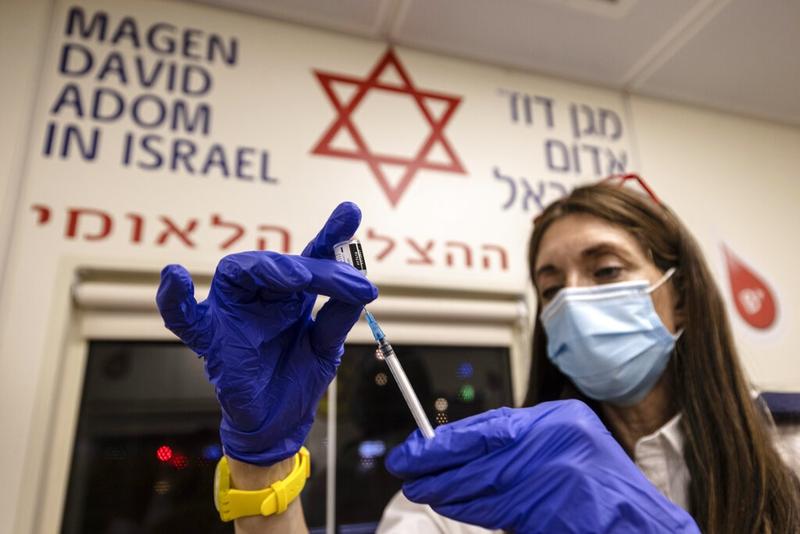 A medic from Israel's Magen David Adom emergency service prepares a booster shot of the coronavirus vaccine in Tel Aviv, Israel on Aug 14, 2021. (TSAFRIR ABAYOV / AP)
A medic from Israel's Magen David Adom emergency service prepares a booster shot of the coronavirus vaccine in Tel Aviv, Israel on Aug 14, 2021. (TSAFRIR ABAYOV / AP)
SYDNEY / YANGON / COLOMBO / KUALA LUMPUR / NEW DELHI / WELLINGTON / TOKYO / NEW DELHI / RAMALLAH / GAZA / SEOUL / JERUSALEM / MANILA - Individual tourists who are vaccinated against COVID-19 will be able to enter Israel from next month, the government said on Thursday, further easing curbs on foreign arrivals that were imposed when the pandemic broke out.
A joint plan between the tourism and health ministries and Prime Minister Naftali Bennett will allow the admission of foreigners who received vaccines within the last six months from Pfizer/BioNTech, Moderna, AstraZeneca, Johnson & Johnson, Sinovac and Sinopharm as of Nov 1.
A joint plan between the tourism and health ministries and Prime Minister Naftali Bennett will allow the admission of foreigners who received vaccines within the last six months from Pfizer/BioNTech, Moderna, AstraZeneca, Johnson & Johnson, Sinovac and Sinopharm as of Nov 1
Under the plan, those who have recovered from COVID-19 may also enter Israel, subject to receiving one vaccine dose approved by the World Health Organization.
The plan is subject to cabinet approval and "will be updated in accordance with developments and the discovery of new variants", the joint statement said.
On Sunday, Bennett told cabinet ministers "as we are managing the gradual exit from the Delta wave, we are preparing the infrastructure for the 'Omega' scenario'," the code name for a new variant.
Israel's borders have largely been closed to foreigners since March 2020. It has in recent months allowed in small groups of vaccinated tourists and first-degree relatives of Israelis.
The tourism ministry has been pushing hard to allow all vaccinated tourists to enter. Israel's economy is open with the exception of the battered tourism sector.
The health ministry has advised caution given the possibility of new coronavirus variants.
Tourism in 2019 hit a record high of 4.55 million visitors, contributing 23 billion shekels ($7.2 billion) to Israel's economy.
With daily infections near zero in June, Israel was set to open to all foreign tourists for the peak summer season but the Delta variant led to a spike, putting those plans on hold.
On Wednesday, 1,021 people tested positive for the coronavirus. While there are more than 15,000 active cases, only 331 are considered in serious condition.
Australia
Millions in Melbourne are readying to come out of the world's longest COVID-19 lockdown later on Thursday even as cases hover near record levels, with pubs, restaurants and cafes rushing to restock supplies before opening their doors.
Since early August, residents in Australia's second-largest city have been in lockdown - their sixth during the pandemic - to quell an outbreak fuelled by the highly infectious Delta strain.
Officials had promised to lift lockdowns once double-dose vaccinations for people aged above 16 exceeded 70 percent in Victoria state, of which Melbourne is the capital.
Prime Minister Scott Morrison on Thursday confirmed the state had reached that target, with more restrictions set to ease as inoculations hit 80 percent and 90 percent.
"The longest road has been journeyed in Victoria and that long road really starts to open up tonight," Morrison told Seven News on Thursday.
From 11:59 pm Thursday, pubs and cafes can have 20 fully vaccinated patrons indoors and 50 outdoors, while hairdressers can allow entry for five customers. Masks will still be mandatory both indoors and outdoors.
By then, the city of five million would have spent a cumulative 262 days, or nearly nine months, under stay-home orders since March 2020 - the world's longest, exceeding a 234-day lockdown in Buenos Aires, according to Australian media.
As businesses prepare to welcome customers, daily infections rose to 2,232 in Victoria on Thursday, the second highest daily count in any Australian jurisdiction during the pandemic.
Bangladesh
Bangladesh received on Tuesday a new batch of Sinopharm vaccines from China, a day after it got a batch of China-aided Sinovac COVID-19 vaccines.
Abu Zaher, chief health coordinator at Bangladesh's Ministry of Health and Family Welfare, received the consignment at the airport.
Health ministry spokesperson Maidul Islam Prodhan told journalists that the plane of Biman Bangladesh Airlines carrying 5.5 million doses of the Sinopharm vaccine arrived at Hazrat Shahjalal International Airport at about 1:40 am local time Thursday.
Bangladesh's vaccination drive is currently running smoothly in the capital Dhaka and elsewhere, largely thanks to China's continued vaccine support.
Bangladesh launched its COVID-19 vaccination drive in January to contain the pandemic that has spread across the country.
The Bangladeshi government halted administering the first dose of the AstraZeneca vaccine after India banned vaccine exports.
In June, the vaccination drive resumed in parts of the country with the China-donated Sinopharm vaccines.
Indonesia
Indonesia is tightening air travel measures to ensure an anticipated jump in the number of passengers ahead of year-end holidays won’t lead to a resurgence in coronavirus infections.
Airlines must allocate dedicated seats for any passengers who show symptoms during the flight, even when they have tested negative for the virus before departure, according to COVID-19 taskforce spokesman Wiku Adisasmito.
Only vaccinated people who can produce a negative PCR test result are allowed to fly, particularly in Java and Bali areas, he said in a briefing Thursday. Previously, those who are fully inoculated only need a negative rapid antigen test in lieu of a PCR one.
Indonesia has started reopening its international borders as cases and deaths from COVID-19 fell to their lowest since the middle of last year. The country has loosened much of its pandemic restrictions to revive the economy.
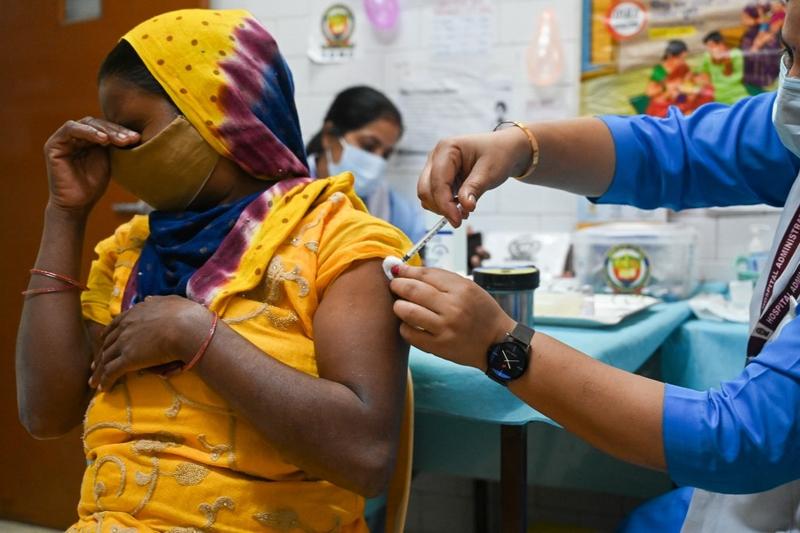 A health worker inoculates a woman with a dose of the Covaxin vaccine against the Covid-19 coronavirus at a health center in New Delhi on Oct 21, 2021. (PRAKASH SINGH / AFP)
A health worker inoculates a woman with a dose of the Covaxin vaccine against the Covid-19 coronavirus at a health center in New Delhi on Oct 21, 2021. (PRAKASH SINGH / AFP)
India
India has given out 1 billion doses of COVID-19 vaccines, a key milestone in an inoculation campaign that still faces significant challenges.
The nation hit the landmark number of doses as of Thursday, according to data from India’s CoWin app. But while 51 percent of the entire population has received at least one shot, only 21 percent are fully vaccinated with both the doses underscoring a wide disparity, according to Bloomberg’s vaccine tracker.
The Indian government is aiming to vaccinate all adults by the end of the year.
Hesitancy to get a second shot is a potential issue in India’s vast countryside especially as new infections dip, chipping away at the sense of urgency. In many rural areas, handouts in government-sponsored welfare programs were tied to having just one shot, while no such benefits are attached to getting the second dose on time. Moreover, some rural residents need to travel long distances to gain access to vaccinations.
India’s inoculation drive needs to stay on course to prevent further virus waves, according to Bhramar Mukherjee, a professor at the University of Michigan’s School of Public Health. There’s a “lot of heterogeneity in vaccination across states, so we need to keep those jabs going,” she said.
Israel
The Pfizer/BioNTech COVID-19 vaccine is highly effective at preventing infection and symptomatic disease from the Delta variant among 12- to 18-year-olds, research conducted in Israel shows.
The findings, published in the New England Journal of Medicine, will likely provide further reassurance the shot is effective against the variant among younger people as the US drug watchdog considers authorizing use of the vaccine on children as young as five.
The study found the estimated vaccine effectiveness against documented COVID-19 infection in adolescents was 90 percent, and 93 percent against symptomatic COVID-19, on days seven to 21 after the second dose.
Israel's Clalit health maintenance organization and Harvard University researchers reviewed data from 94,354 vaccine recipients aged 12 to 18 who were matched with an identical number of unvaccinated adolescents from the same age group.
The research was conducted between June and September, when the Delta variant was the main strain in Israel.
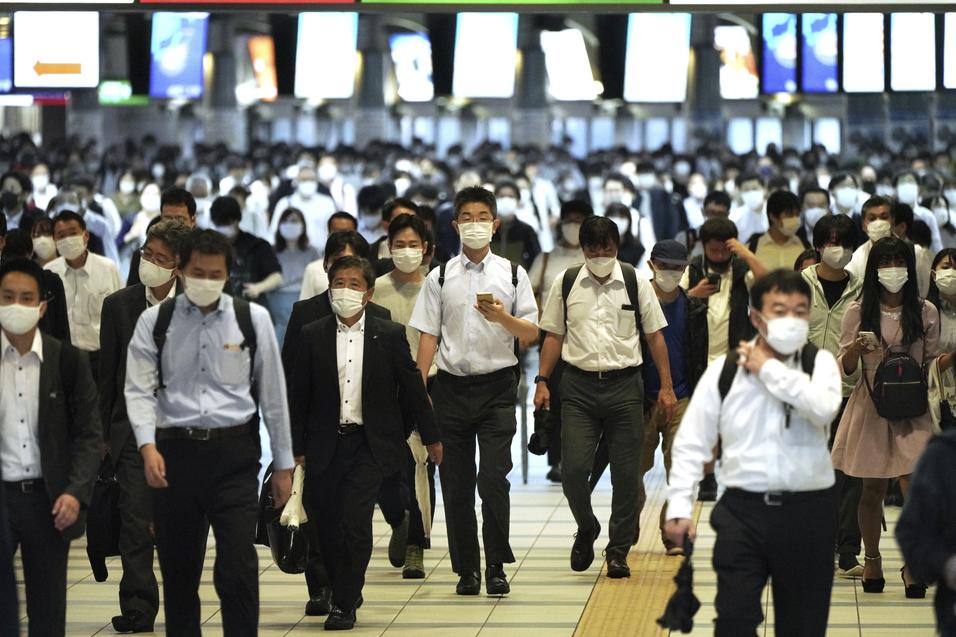 In this file photo taken on Oct 1, 2021, commuters wearing face masks to help curb the spread of the coronavirus walk in a passageway during a rush hour at Shinagawa Station, in Tokyo. (EUGENE HOSHIKO / AP)
In this file photo taken on Oct 1, 2021, commuters wearing face masks to help curb the spread of the coronavirus walk in a passageway during a rush hour at Shinagawa Station, in Tokyo. (EUGENE HOSHIKO / AP)
Japan
Japan's Shionogi & Co Ltd said on Wednesday it started a Phase II/III clinical trial for its COVID-19 vaccine candidate.
The trial for the recombinant protein-based vaccine will take place in Japan and follows a Phase I trial in the country, Shionogi said in a statement. The company will also prepare to conduct multiple trials globally, it said.
Palestine
Palestine recorded fatalities among the vaccinated amid a lack of PCR tests to detect the new Delta mutation AY4.2, a senior health official said Wednesday.
In a statement, Palestinian Health Minister Mai al-Kaila said that the West Bank recorded several deaths, "the last of which was about two weeks ago of a person who was vaccinated with two doses of the Pfizer vaccine."
Palestine on Wednesday recorded five deaths and 275 new cases in the West Bank and the Gaza Strip in the last 24 hours, according to the health ministry's daily COVID-19 report.
On Tuesday, Israeli media reported that the first case of new Delta mutation AY4.2 was diagnosed in Israel. Palestinian health officials in Gaza and the West Bank expect the new variant to reach the Palestinian territories soon.
Papua New Guinea
As the Pacific nation of Papua New Guinea grapples with its rapidly escalating COVID-19 outbreak, fears mount for the country's already fragile health care system.
According to latest figure from the PNG government, as of Tuesday, there were 413 new cases. The total cases in the country reached 25,796 with 2,868 active cases and 312 cumulative deaths.
All major hospitals, including Port Moresby General Hospital in the island nation's capital and Mt Hagen General Hospital in the Western Highlands, are reportedly inundated with patients suffering from the highly virulent Delta strain of the virus.
The most recent data shows that under 1 percent of PNG population has been fully vaccinated, with less than 200,000 doses having been administered across a population of nearly 9 million.
Health authorities also expressed their concern that the virus would begin to spread into rural areas.
ALSO READ: Singapore extends virus curbs for month as ICU beds fill up
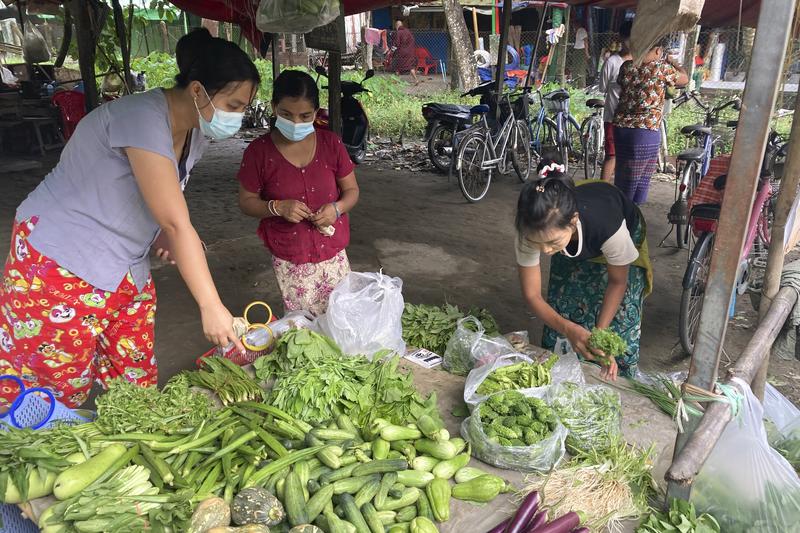 Customers buy vegetables at a local morning bazaar, Oct 12, 2021, in Yangon, Myanmar. (PHOTO / AP)
Customers buy vegetables at a local morning bazaar, Oct 12, 2021, in Yangon, Myanmar. (PHOTO / AP)
Myanmar
The number of daily COVID-19 cases dropped below 1,000 for the first time since July in Myanmar, according to the figures released by the Ministry of Health on Wednesday.
Myanmar reported 893 new COVID-19 infections with a daily test positivity rate of 6.95 percent, bringing the tally to 490,901 on Wednesday, the ministry's data showed.
The death toll has increased to 18,444 on Wednesday after 28 new deaths were reported in the past 24 hours.
As of Wednesday, a total of 443,719 recovered patients have been discharged from hospitals.
According to the ministry's figures, over 4.98 million people have been fully vaccinated while over 7 million people had received the first jabs of COVID-19 vaccines across the country as of Tuesday.
Malaysia
Malaysia reported another 5,516 new COVID-19 infections as of midnight Wednesday, bringing the national total to 2,407,382, according to the health ministry.
Some 14 of the new cases are imported, with 5,502 being local transmissions, data released on the ministry's website showed.
Another 76 more deaths were reported, bringing the death toll to 28,138.
Another 9,401 patients were released after recovery, bringing the total number of cured and discharged to 2,297,289.
Of the remaining 81,955 active cases, 666 are being held in intensive care and 329 of those are in need of assisted breathing.
The country reported 256,497 vaccine doses administered on Wednesday alone and some 77.4 percent of the population have received at least one dose and 71.2 percent are fully vaccinated.
New Zealand
New Zealand reported 102 new Delta variant cases of COVID-19 in the community on Thursday, bringing the total number of confirmed cases in the country's community outbreak to 2,260.
Ninety-four of the new infections were recorded in the largest city of Auckland and eight in nearby Waikato, Director-General of Health Ashley Bloomfield told a press conference.
New Zealand also reported two new cases identified at the border in recent returnees. The cases have remained in quarantine in Auckland.
Philippines
The Philippines' Department of Health reported 4,806 new COVID-19 infections on Thursday, pushing the number of confirmed cases in the Southeast Asian country to 2,740,111.
The DOH also reported that 260 more people died from COVID-19 complications, bringing the country's death toll to 41,237.
Despite the decline of COVID-19 cases, the DOH data showed that Metro Manila, home to over 13 million people, remains the top region with the most active and new cases.
The DOH reported its highest ever daily tally on Sept 11 with 26,303 cases. The Philippines with an around 110 million population has tested more than 21 million people since the outbreak in January 2020.
South Korea
South Korea reported 1,441 more cases of the COVID-19 as of midnight Wednesday compared to 24 hours ago, raising the total number of infections to 347,529.
The daily caseload was down from 1,571 in the previous day, but it hovered above 1,000 for 107 straight days since July 7. The daily average tally for the past week was 1,408.
The recent resurgence was attributable to cluster infections in the Seoul metropolitan area.
Of the new cases, 502 were Seoul residents. The number of newly infected people residing in Gyeonggi province and the western port city of Incheon was 523 and 104.
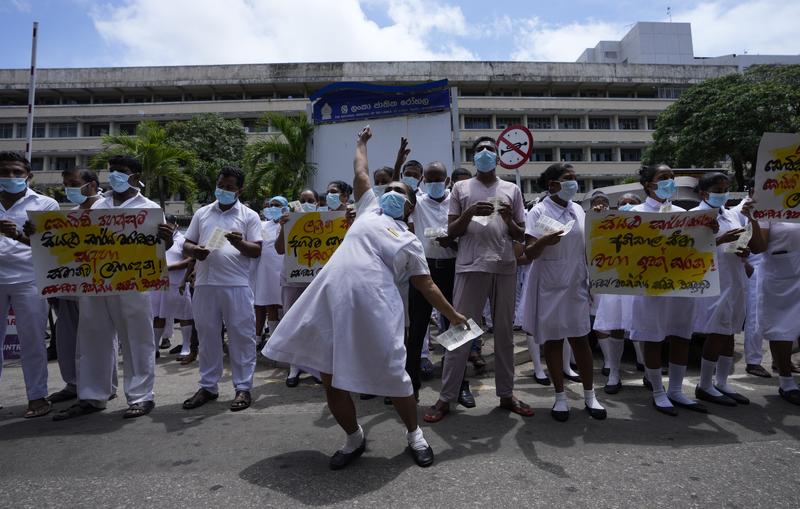 Sri Lankan health workers representing joint trade unions shout slogans demanding due financial benefits and personal protective equipment to secure from coronavirus during half a day strike action in Colombo, Sri Lanka, Oct 8, 2021.
( ERANGA JAWADENA / AP)
Sri Lankan health workers representing joint trade unions shout slogans demanding due financial benefits and personal protective equipment to secure from coronavirus during half a day strike action in Colombo, Sri Lanka, Oct 8, 2021.
( ERANGA JAWADENA / AP)
Sri Lankan
Sri Lankan authorities on Wednesday extended an inter-province travel ban till Oct 31 to prevent a further spread of the COVID-19 pandemic.
Sri Lanka's Army Commander General Shavendra Silva said the interprovincial travel ban had been extended on the instructions of President Gotabaya Rajapaksa in order to prevent the movement of people from one province to another.
"Public behavior is vital to prevent the spread of COVID-19 but some people are behaving in an irresponsible manner and the decision to further extend the travel restrictions was taken considering the situation," Silva said.
Sri Lankan authorities earlier this week said they had tightened the travel ban to prevent people from crossing the provinces especially as the country commemorates two religious holidays this week.
According to the President's Media Division, Rajapaksa had issued instructions to the security forces to closely and strictly monitor vehicular movement at all provincial borders.
Therefore, security had been tightened at all provincial borders, police said.
ALSO READ: As COVID-19 cases surge in UK, Israel offers lesson in boosters
Sri Lanka earlier this month lifted a 42-day nationwide lockdown as the country faced a third wave of the COVID-19 virus caused by the highly contagious Delta variant.
Health experts said the spread had now reduced drastically but the provincial ban would remain.
To date, Sri Lanka has recorded 532,766 positive COVID-19 patients while 13,525 deaths have been reported since March last year.


